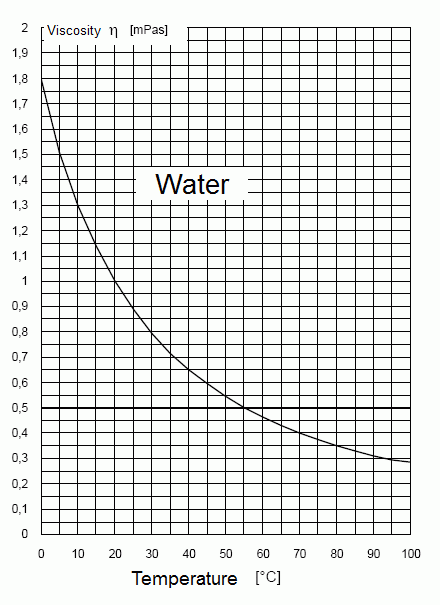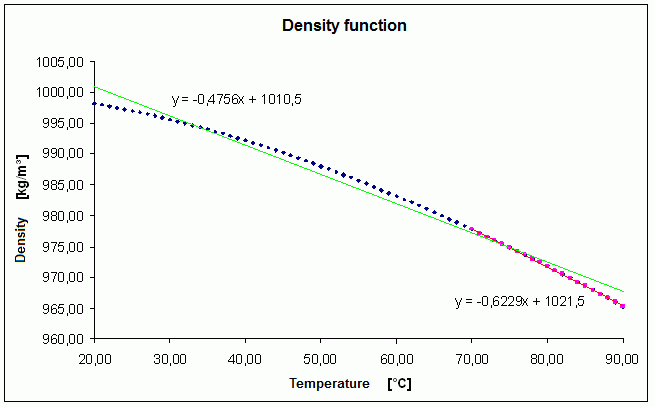Viscosity
Viscosity is a property that is due to the internal friction of the liquid. The unit of viscosity is [kg/m s)] or Pascal-second [Pa s].
The dynamic fluid viscosity η [kg/(m s)] and, in the case of large temperature gradients, the density ρ [kg/m³] are temperature-dependent variables whose change with temperature means that the differential equations (the transient flow and energy transport equations) represent a coupled system of differential equations. An experimental formula to describe the relationship between dynamic fluid viscosity and temperature is used in the calculation:


Dynamic viscosity η of water as a function of temperature at a density of ρ= 1000.0 [kg/m³]
The unit millipascal second [mPa s] corresponds to the unit 1000*[kg/(m s)]. The following relationship applies between dynamic and kinematic viscosity:
dynamic viscosity: η = μ * ρ [kg/(m s)]
kinematic viscosity: μ = η / ρ [m²/s]
With:
η = dynamic viscosity [kg/(m s)]
μ = kinematic viscosity [m²/s]
ρ = density [kg/m³]
Temperature-dependent density
In SPRING, a linear dependence of the density [kg/m³] on the temperature T [°C] is considered:
ρ(T) = ρ0 + α(T - T0)
With:
ρ(T) = temperature dependent density [kg/m³]
ρ0 = density of the reference temperature T0 in [kg/m³], default is ρ0 = 1000.0 [kg/m³]:
ρ0 = ρ(T = T0)
T0 = Reference temperature [°C], the default setting is T0 = 20°C
α = constant density gradient, the default setting is α = 0.0
The following figure shows the dependence of density on temperature:

Temperature-dependent density function
In this case is:
ρ0 = ρ(T0=20 °C) = 1010,5 [kg/m³]
The density function is approximated in the temperature interval under consideration (here: approx. 32 - 75 °C) by a straight line equation (green line), which defines the density gradient α.
In the example, the density gradient α = constant = -0.4756. (This corresponds to the gradient (= 1st derivative) of the straight line:

If the initial or calculated temperatures are in a different temperature range, it may be necessary to use a different temperature range to define another equalisation line (red line).
 Realization in SPRING
Realization in SPRING